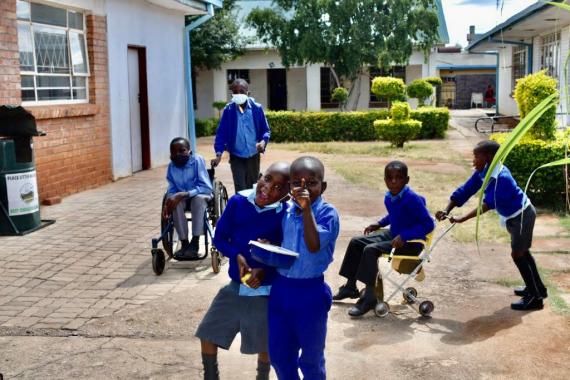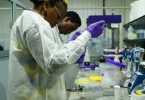A recent online article about special needs education in Nigeria, written by Greensprings School, revealed an astonishing detail. It pointed out a report by The Vanguard newspaper that there were about 7 million out-of-school children with special needs in Nigeria in 2016. This figure represents a staggering 70% of out-of-school children (totaling about 10 million) for that year. The reason? Because these children suffered from one disability or another that impacted on their ability to learn as fast as other kids. Thus the ‘normal’ curricula designed to cater for students of primary and secondary schools in Nigeria, could not serve their needs.
We are speaking of a set of curricula that has been problematic in itself for decades. Largely because Nigerian education curricula did not evolve much from the colonial education that birthed it in the first instance. It has been mostly theory-ridden, low in creativity and cumbersome for teachers, in the face of a large student population. Technology-powered and highly engaging instructional aids for both students and teachers have been lacking in many schools for a long time. Especially the government (or public) schools, right from the primary to tertiary levels – which by the way are over-populated.
And now these ‘special needs’ children are practically being cut off and unattended to. It was concluded therefore that the Nigerian brand of education is largely ‘non-inclusive and inaccessible to children with disabilities’. Does this mean that the policy makers that designed the Nigerian education system as it is today, see special needs children as useless? Should the parents of a special needs child regret being Nigerian citizens? Or even loathe the fate that befell them?
And one may ask – does a special needs child stand a chance of being productive and independent in the future? We shall attempt to answer these questions in this article. As we believe no child should be denied access to quality education – one of the basic needs of every human being.
Understanding Special Needs Education: What Actually is it?
The Encyclopedia Britannica website explains the concept of special education as follows:
‘Special education, also called special needs education, is the education of children who differ socially, mentally, or physically from the average to such an extent that they require modifications of usual school practices. Special education serves children with emotional, behavioral, or cognitive impairments or with intellectual, hearing, vision, speech, or learning disabilities; gifted children with advanced academic abilities; and children with orthopedic or neurological impairments.’
It was clearly stated by the United Nations General Assembly in 1975 that:
‘Disabled persons have the right to education which will enable them to develop their capacities and skills and will hasten the process of their social integration.’
Indeed humanity has advanced beyond the stage where disability is classified as a burden. Whether such persons are impaired socially, mentally or physically, does not stop them from contributing to the advancement of society. For instance, many children with learning disabilities have been observed to grow into geniuses in the art, sciences or even business world.
Albert Einstein, Louis Pasteur, Charles Darwin, and several others were great scientists who grew up with learning disabilities. Elon Musk, Lionel Messi, Bill Gates, Eminem, Steven Spielberg, Henry Cavendish, Keanu Reeves, Stevie Wonder. These are just a few amongst countless other world celebrities who are either autistic, or had learning disabilities growing up. The physicist Stephen Hawking was disabled before his death, yet he excelled (though he was not born that way).
Many physically disabled children have been known to excel in sports, business, crafts, music, real estate, the arts, and other major professions. So why cut them off from the rest of humanity in the false belief that they are a burden? The renowned but blind Cobhams Asuquo, a giant in the Nigerian music industry, should serve us as an inspiration.
Special Needs Education: A Case to Change the Narrative
Many schools that claim to have an inclusive education to cater for special needs students, do not actually welcome them in practice. What is responsible for such treatment? Some educational experts have identified the following causes:
- Possible lack of adequate funds
- Lack of trained teachers
- Negative perception
- Cultural beliefs
Special education, inclusive education, special needs education. However we choose to address it, there is a strong argument to help special needs children learn side-by-side with other ‘normal’ children. That is, in the same classroom. Nigerian education curricula should mandate that a broad array of highly effective learning aids be made available to assist such children. Audio, visual, audio-visual, play-based, game-based and project-based learning aids are highly essential to these special groups of learners. That along with well-trained teachers to give particular attention to such needy students.
Educators and school administrators need to go the extra mile to create an engaging environment for such impaired learners. In fact, well-assisted special needs children have the capacity to perform as well as their counterparts in the long run – if not better. Experience has proven this fact. Even though the societies where such achievers grew up were hostile in some cases, they managed to break through. Thus they should be allowed to participate in classroom as well as extra-curricular activities, to help each child discover his/her calling. It will also help these needy children to feel safe, have a sense of belonging, and be encouraged to excel.
Reasons Why Special Needs Education Should be Included in the Nigerian Education Curricula
For the following reasons, the Nigerian classroom urgently needs to develop an all-inclusive educational curricula. This will help special needs children learn effectively and develop their social, academic and other aspects of their lives with little inhibition.
Cultivating an Environment with Healthy Friendships
The healing of a special needs child starts first with a healthy teacher-student relationship. The teacher needs to cultivate a one-on-one relationship with each child. Thus he/she communicates with each student regularly, encourages each student to speak for themselves, and be more involved in their learning. Special needs children need that attention as well – without openly segregating them from the crowd. Additionally, a specially-trained teacher may be needed to handle and monitor cases of a special need child who overreacts in class.
Then it progresses to increased involvement of the parents in the learning process of the child (every child needs this as well). But ultimately, building relationships amongst the students themselves is vital. As special needs children interact with other children, they gradually develop social skills and friendships with them. As such they have a greater sense of belonging, and quicker adjustment to the learning environment. This encourages them to learn better and avoid emotional problems.
Improved Perception of Themselves as Well as Others
The inclusive environment teaches all students to be tolerant of one another. They learn to understand and accept the unique needs, abilities and skills of every other student regardless of their personal challenges. Thus, it promotes the culture of mutual respect, and shuns condemnation or shaming of others. Learning to help one another when it is necessary often becomes the norm in such an environment.
Active Involvement of Parents in their Education
The inclusive environment is a perfect medium for encouraging affected parents to be more involved in their child’s education and activities. Such parents are motivated to stay committed to the school. Also, they participate more in cheering up and encouraging their kids as they partake in both academic and extracurricular activities. Very likely, a special needs child would excel in one activity or another, and his/her parents would be proud to witness such events. It could be sports, quizzes, debates, arts and crafts, coding, vocational skills or other such activity.
Enhanced Academic Performance
There is a strong tendency for students who learn together in an inclusive environment, to perform better in their academics. The reason being that the interactions, group/team work, and matching up against each other allows each child to evaluate his/her performance. Each student can think deep, observe others, and set higher learning goals for himself/herself. That would definitely rub off on students with special needs. Such a needy student would be encouraged to challenge himself/herself to go the extra mile and perform better.
Working Towards an Inclusive Society
To build an inclusive society where citizens can tolerate, help and understand each other needs to start early. It should start from right inside the classroom. By learning the principles of social inclusion at an early age, it would reduce discrimination and encourage more social participation. It would also boost the practice of equity, justice, and better communal relationships later in life. Thus special needs children are better able to contribute positively to society later on.
Cultivating Good Leadership Skills
Inclusive education that pays attention to special needs children teaches empathy. Students (even teachers and parents) learn to work together amicably; learn to support, defend and encourage one another. This tendency is vital in developing good leadership skills (and thus shunning abusive behaviours) later on in life. It also teaches self-responsibility and social responsibility.
And not the least, students in such an environment may discover their hidden talents and abilities. As they take up roles while offering mutual help to one another, it may bring out their special abilities and skills. This may not easily take place if students are segregated from one another because of learning disabilities.
Helping Parents to Fulfill their Dreams
The encouraged and increased interaction between special needs children and their classmates positively boosts their self-esteem. This will eventually improve their academic performance, and they are encouraged to work harder to meet and surpass expectations. The parents of such children also achieve their dream of giving the best quality education to their child. This will be coupled with seeing him/her develop in a healthy way without discrimination or being stigmatized.








